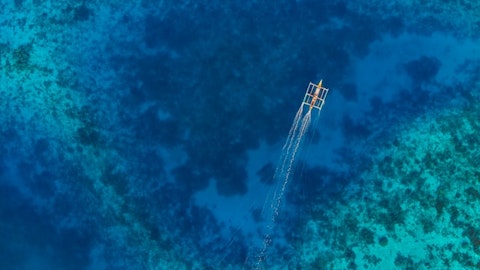Annmarie Gayle: No, look, as I said, just to be clear, so what we did in year-to-date as a business, we’ve done something like $15 million. For the rest of the year, I think that we are going to be doing something like $5.5 million. So, more in line. Overall, our results look more to be in line with $21 million for 2023. So that’s what we can see today for our last quarter.
Brian Kinstlinger: Okay. Thank you.
Operator: [Operator Instructions] Our next question is from Walter Ramsley with Walrus Partners. Please proceed.
Walter Ramsley: Oh, thank you. Got a couple of questions. Is the company investigating any strategic alternatives?
Annmarie Gayle: Strategic alternatives? Hi, Walter, what do you mean by strategic alternatives?
Walter Ramsley: Well, I guess not. Okay. The fourth quarter is coming up, do you have any intention or have you begun to consider any way establishing reserves or doing any write-offs? The inventories are up to like $11 million now. So, anything that could happen there?
Annmarie Gayle: No, not at all. I mean, as you know, I mean, a lot of our inventory, the makeup of our inventory, Walter, has to do with our Echoscope technology, our DAVD technology. So, we don’t see the use. And also our particular design for those systems, I don’t see the use case for writing off inventory at all. None of the inventory we carry as such is obsolete inventory. So, we don’t have any plans to make any reserve at all, because we think our inventory is current.
Walter Ramsley: Okay. And just one last thing. If you could possibly elaborate, if you know the answer anyhow. It just seems preposterous to somebody on the outside that the U.S. Navy would allow its R&D operation to be hijacked by the Army to work on land-based systems. Can you explain what’s going on there?
Annmarie Gayle: Well, no. I think that it’s just where they are. I mean things where the fighting force I think is right now, I mean they’re looking for aircraft, land-based defense, not naval defense in Ukraine. So, I think really that’s pretty much what the situation is. They are not doing removing mines at this stage as you would have read in the news. They are pretty much now fighting using land-based defense systems. And this is the problem for our business that priorities — they’ve not gone away, they’ve just shifted for the time being.
Walter Ramsley: Well, okay, I’ll accept that I guess, but it still sounds a little crazy. And I guess one more. Excluding the military, you did obviously point out offshore wind is a big problem and everybody knows that. But as far as a lot of the other vertical markets the company used to focus on at any rate, I mean, are they all under pressure as well? Or is this due to the interest rates you think? Or is it just the offshore wind?
Annmarie Gayle: Well, it’s not really just the offshore wind, but if you look at the breakdown of our results, what I can say to you, year-to-date, I can say equipment sales have gone up by 3.9%. For example, reinforcement of the growth pillars that we have, that’s all DAVD and the [indiscernible] solution where we have steam pressure or softening rentals which are down by 36.9%, software sale, which goes with our hardware, up by 13.4%, and again, services which are part of our rental package and some customization work, is down by 36.9%. So, really the softening that we are seeing or weakening in the market is around offshore wind. And I think a large part of the problem, Walter, is about some of the big European offshore developers. They’ve been delayed in entering the U.S. market and they’re the ones with the expertise. And I think at some point these delays…
Walter Ramsley: No, I understand all of that. I mean the wind is — I mean I live in Cape Cod, so I know all about the offshore wind situation. But I was thinking more about the oil and gas mapping, salvage, dredging, bridge inspection, port security, all that stuff, is that down also?
Annmarie Gayle: Well, as I said, what we see in the numbers, which really is really about services softening, I’m not seeing — equipment sale, year-to-date, have gone up. So, I think for applications such as construction in Japan might slow a little bit, but I think these are more projects being postponed than going away. Oil and gas, I mean, this year, we were up. I mean, we did — in the previous year, 1.3% of our Marine Technology Business was in oil and gas. This year, it’s 4.5%. So, it’s a mixed picture. But I think the overriding weakening has been around offshore renewables and some sort of strategic geographies like Asia, we’ve experienced a slow rate of conversion. But what I can say, I don’t necessarily see our inquiries level tapering off. We’re quoting a good level in those markets. They’re just slow in converting into firm orders.
Walter Ramsley: Okay. That’s very helpful, Annmarie. Thanks for answering the questions.
Annmarie Gayle: No problem, Walter.
Operator: Our next question is from William Bremer with Vanquish Capital Partners. Please proceed.
William Bremer: Good morning, Annmarie.
Annmarie Gayle: Good morning, Bill.
William Bremer: So, my question tails with Walters. Would you mind providing us your initiative on the U.S. commercial market? Given the infrastructure bill, which targets bridge work, including oil and gas offshore, now that the commodities are approaching $90 a barrel domestically here, surely I would assume that your products there are needed.
Annmarie Gayle: Well, they might be needed, Walter — sorry, Bill. But, as I said, we’re responding to good level of inquiries globally, in the U.S. also. But it just takes time to convert some of these. I feel optimistic about the technology in the spaces that you have highlighted. And we have business development activities globally, but it does take time to convert opportunities into orders, especially when you are talking about a piece of equipment being $250,000, it’s not the sale we make overnight. So that’s really — yes, so…
William Bremer: I think the question I was asking was, on the corporate level, do you have specific targeted sales personnel going after the U.S. market, which, at this time, is far advancing especially in the capital initiatives on the oil and gas and offshore markets here versus Europe?





